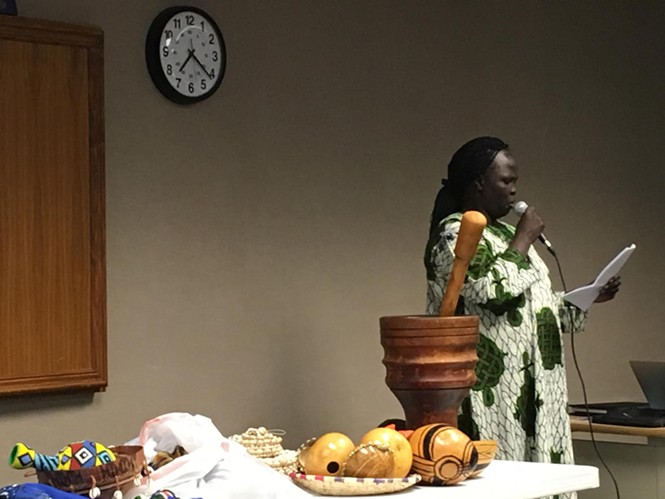Tuesday, April 11, 2017
"We’ve seen nothing but war”
South Sudanese immigrants share their story.
Posted By Dylan Woolf Harris on April 11, 2017, 11:36 AM
When Nyandeng Aleu was a teen, she fled for her life from her home in then-southern Sudan, a war-torn nation, eventually making it into Uganda and then into a refugee camp in Kenya where she lived for 10 years.
“I spent my early life running from somewhere to nowhere, nowhere to somewhere,” she said.
Aleu shared her harrowing story at a refugee forum Monday evening sponsored by the Utah Refugee Connection, Granite School District and the Utah Refugee Connection. It was the second in an ongoing twice-monthly series where attendees are exposed to new cultures and experiences from refugees who relocated to Utah.
Aleu says before she made it to the refugee camp in Kenya, she and other displaced Sudanese lived nomadically. They were tired, hungry and desperate, eating tree leaves and drinking dirty water to survive. At some point in the journey, she “became a wife and a mother” and fashioned a makeshift hut out of a mosquito net.
With no hospitals or medical experts, birthing her children was a precarious endeavor that required severing the umbilical cord with a shard of broken glass, she said. Her family tried to stay hidden as they continued to live in the bush.
The little peace they found would not last.
During a raid, she got separated from her husband, she said, yet she continued with her children to the Kenyan camp. Life among the refugees was stable, according to Aleu, but far from safe. Women who wandered out to collect wood were subject to rape and looters would ransack the camps.
“I continued to live in constant fear,” she said. Her life changed when she was able to leave.
In 2004, she and her family were admitted into the U.S.—Salt Lake City, Utah. Culturally shocked but not deterred, Aleu enrolled in courses, and earned a high school diploma within a year. She was then hired by Deseret Industries as a cashier and enrolled in community college.
“I was exhausted most of the time but knew I had to provide an example to my children, show them the benefit of hard work and education,” she said. Aleu was eventually granted U.S. citizenship and completed a college certificate program.
“That’s my life,” she concluded.
South Sudan split off from Sudan as an independent country in 2011. Its tragic origin has continued into countryhood and parts of the region remain at war.
Victoria Bak, also from a South Sudan tribe, settled into Utah in 1999. She shared aspects of Sudanese culture with attendees, and passed around tools—a large wooden pestle, for example—as well as decorative bowls.
Emmanuel Walla talked about the history of South Sudan beginning with imperial invasion to the present. More than 60 tribes live in South Sudan, each with its unique culture, some with their own languages.
“We’ve seen nothing but war,” he said.
Amy Harmer, the executive director for Utah Refugee Connection, said an estimated 3,000 to 4,000 South Sudanese refugees live in Utah.
In total, about 60,000 refugees live in Utah from 20 different countries and speak 40 different first-languages. Salt Lake City is the second largest location city for at-risk women, and Utah is only 1 of 11 states that resettles unaccompanied minors.
More by Dylan Woolf Harris
-
Dabakis Is Leaving the Building
Ever boisterous and outspoken, state senator says lending liberal voice trumps his bill tally.
- Apr 4, 2018
-
Gagged and Bound
Row between South Salt Lake and muralist gets the burlesque treatment.
- Mar 21, 2018
-
Inland Port Authority Update
Gov. Herbert signs contested bill into law.
- Mar 16, 2018
- More »





